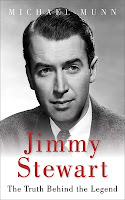Jimmy Stewart: The Truth Behind the Legend by Michael Munn
There were some good stories in this biography but I wasn't keen on the way it was put together. It jumped around a lot making it feel choppy and repetitive. Quotes from Mr. Stewart's wife, Gloria, and others made up much of it, and summaries of the plots of his films made up the rest. The latter filled up the pages but didn't tell me anything about the subject.
It was fun to read about his co-stars - familiar names of that era: Henry Fonda, Cary Grant, Clark Gable, Katherine Hepburn, Olivia DeHaviland, Gregory Peck, Van Johnson, etc - and his WWII service and later involvement with the FBI were interesting, but I didn't come away with a real understanding of who he was as a person. There was an inordinate emphasis on the number of women he had flings with, on the dangers of his losing his temper, and of his discomfort around people of colour. True or not they were brought up so often as to stretch credibility and again seemed to be more to fill the pages than anything else. The image I'm left with feels more like a caricature than a well rounded picture of a real person.
It wasn't awful but I do think there must be better biographies of Jimmy Stewart out there.









